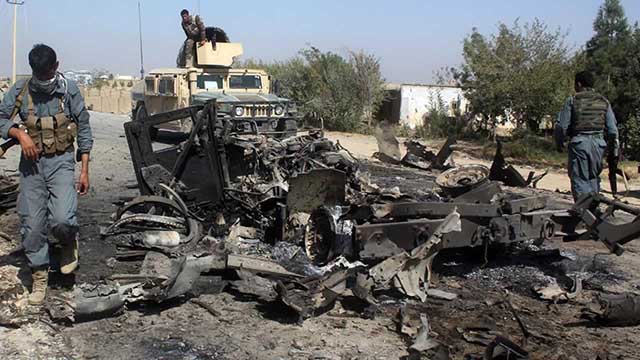Human rights and dignity are violated to a great extent in the Taliban dominated areas. Life is highly cheap and the rights to liberty and property are trampled upon flagrantly. The people, mainly women and children, suffer mentally and physically in restive parts of the country. As a result, Amnesty International’s recent report on the conflict in Kunduz said mass murders, gang rapes and house-to-house searches were carried out by Taliban death squads while they had control of the city.
“The multiple credible reports of killings, rapes and other horrors meted out against the city’s residents must prompt the Afghan authorities to do more now to protect civilians, in particular in areas where more fighting appears imminent,” said Horia Mosadiq, Afghanistan researcher at Amnesty international in the report.
The Taliban ideologue and mercenary fighters pay no heed to human rights. Afghan people, especially women, were bereft of their basic rights under the Taliban regime. There was no room for freedom of expressions and beliefs and religious tolerance. In other words, sectarian violence and discrimination on the basis of race, religion, creed and sex was practiced on a large scale. Women’s role was limited to household chores and schooling and social activities were considered taboo for them. In a nutshell, women took the brunt of discrimination and lacked natural rights and human dignity. The patriarchal mindsets regarding women allowed the regime to treat them as a slave. So, Afghans in particular and the world in general know that Taliban’s ideology is in conflict with ethical codes and religious tenets.
Moreover, the humanitarian rights are abused overtly by the Taliban – who claim to “bring in the Islamic law” or establish caliphate on the surface of earth. The hors de combat soldiers are tortured in the worst possible way and killed with no iota of mercy. Similarly, non-combatants, including women and children, receive fatal injuries, get amputated or lose their lives in suicide bombings and terrorist attacks and then the Taliban claim the responsibility without a tinge of guilt.
The Kunduz takeover, which led to tens of dead and wounded, disgrace of some women, release of the prisoners and financial loss, was a hazardous message and an eye-opener for the government. Reports say that Taliban fighters are expanding the fight to other northern provinces after Afghan government troops backed by NATO special forces evicted them from the centre of the strategic city of Kunduz.
Afghan deputy Army Chief Murad Ali Murad said that the Taliban intended to move Mullah Akhtar Mansour to Kunduz after capturing it last week. “Taliban wanted to have control over Kunduz and bring Akhtar Mansour to the province to hold a press conference there and also show their existence in Afghanistan and that it is through support of Pakistan,” the four-star Afghan General is quoted as saying. He added that the insurgents failed to do so after the security forces launched attacks on the city. He confirmed that the Taliban carried out severe brutalities and also looting sprees during their attack on Kunduz.
The Taliban have been waging an armed struggle since a US-led invasion ousted them from power in late 2001, and have stepped up attacks during a summer offensive launched in late April against the Western-backed government in Kabul.
Last week, 13 people were killed and 33 wounded at a volleyball match in the eastern province of Paktika, while a splinter group affiliated with the Islamic State of Iraq and the Levant (ISIL) launched coordinated attacks on police checkpoints in the eastern province of Nangarhar.
The stunning fall of the provincial capital, even temporarily, showcased the stubborn insurgency’s potential to expand beyond its rural strongholds in the south of the country.
The Taliban’s recent advances in Kunduz and neighboring Takhar and Baghlan provinces highlight that a large and strategic patch of northern Afghanistan is imperiled by a rapidly expanding insurgency.
It is also seen as a game-changer for the fractious militant movement that has been dogged by a leadership crisis since the announcement in July of founder Mullah Omar’s death.
“One year into his presidency, Mr. Ghani is facing a crisis of formidable proportions. On the other hand, the newly installed chief of the Afghan Taliban, Akhtar Mansoor already has a major victory under his belt, which he would use to bolster not only his standing, but also to overcome any remaining resistance to his authority within the insurgent group,” the former interior secretary Rustam Shah Mohmand says.
The recently unmitigated violence and bloodshed – which have led to the exodus of citizens, mass unemployment and economic stagnation – reflect grave challenges in government machineries and put the administration of National Unity Government (NUG) under question. A year has passed from the establishment of NUG, however, ministry of defence and provincial governors, in many provinces, are not introduced and many key positions are vacant – this is a matter of great concern for Afghan nation. Moreover, the government failed to conduct parliamentary election despite the ending term of parliament – this seems a violation of Afghan Constitution but who cares?
On the other hand, the Taliban increase their terrorist attacks and target Afghan combatants and non-combatants alike more than ever before and Mullah Mansour is supported by mysterious hands to wreck further havoc. If this trend continues and the government fails to secure the citizens, the gap between state and nation will widen.

